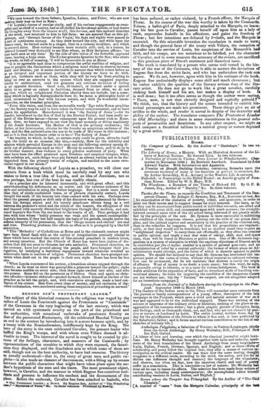EUGRNE SUE'S PROTESTANT LEADER. * Tao subject of this historical romance
is the religious war waged by the orders of Louis the Fourteenth against the Protestants or " Camisards" of the Cevennes in the very beginning of the last century, which was carried on with systematic cruelty on the part of the priesthood and the authorities, with occasional outbreaks of passionate ferocity on that of the persecuted Protestants, till the celebrated Marshal Villars put an end to the contest by introducing into it a more humane spirit, and by a treaty with the Nonconformists, indifferently kept by the King. The hero of the story is the once celebrated Cavalier, the peasant leader who baffled the King's troops, and with whom even Fillers deemed it ad- visable to treat. The interest of the novel is sought to be created by pic- tures of the feelings, characters, and manners of the Camisards ; by representations of the cruelties to which they were exposed, the fanati- cism they displayed, and the fraudulent acts to which some of them are laid, though not on the best authority, to have had recourse. The history as usually understood—that is, the story of great mert and public ex- ploits—is also made an element of the.romacce, with a filling up by-soeues between the public characters that might have taken place upon the au- thor's hypothesis of the men and the times. The most prominent object, however, is Cavalier, and the manner in which Eugene Sue contrives inci- dbato and persons to influence his conduct and the denouement of the piece. Before the outbreak, Cavalier has been attached to Isabelle, who
The Protestant Leader ; a Novel. By Eugene Sue, Author of " This_Wanderlus .■ Mysteries of Paris," 8tc. In three voternee. Published byNeviby.
has been seduced, or rather violated, by a French officer, the Marquis of Florae. In the course of the war this worthy is taken by the Camiaarda. Toition, a ballet-girl of Paris, deeply attached to the Marquis, on learn- ing his fate goes to Cavalier, passes herself off upon him as a lady of rank, supersedes Isabelle in his affections, and gams the freedom of Florae; but her intentions are defeated by I•ftbelle, and the Marquis is executed. On this miserable invention the conclusion is made to turn; and though the general facts of the treaty with Valera, the reception of Cavalier into the service of Louis, his suspicions of the Monarch's bad faith, and his escape, are too notorious to be falsified, yet the character of Cavalier, and in some measure the accuracy of the events, are sacrificed to this precious piece of French sentiment and theatrical taste. The work is translated by a person who seems well versed in the his- tory of the war of the Cevennes, who is able to correct the deviations of Eugene Sue from the strict facts, and who has undertaken the task coo amore. We do not, however, agree with him in his estimate of the book. Eugene Sue undoubtedly displays some skill and much cleverness ; but he rather exhibits the qualities of the literary artisan than of the lite- rary artist. He does not go to work like a great novelist, carefully sinking both himself and his art, but makes a display of both. Ib is well done ; but it too often seems as though the author were saying, " There, now, is not that cleverly designed and capitally painted?' We think, too, that the history and the scenes intended to exhibit his- torical personages are made too prominent. These things give an air of artifice to the ;hole, and render it unreal in despite of the dexterity and ability of the author. The translator compares The Protestant Leader to Old Mortality: and there is some resemblance in the general sub- jects of persecution and fanaticism. In any other respect, we might as well compare a theatrical tableau to a natural group or nature depicted by a great artist.


























 Previous page
Previous page